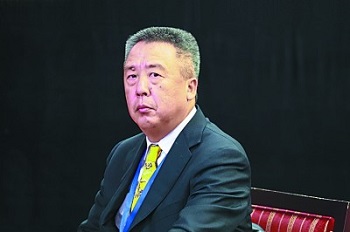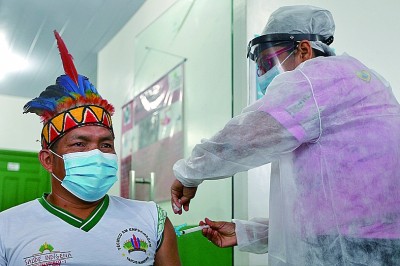


Marcio Pochmann, Director of Lula Institute, Brazil

Guo Cunhai, Special Research Fellow of the Research Center for Xi Jinping Thought of Socialism with Chinese Characteristics in the New Era, Director of Division of Society and Culture, Institute of Latin American Studies, Chinese Academy of Social Sciences

Xiao Lianbing, Secretary-General of International Exchange, Cooperation and Communication Center of Guangming Daily

On January 19, a health worker vaccinates an indigenous person with Chinese COVID-19 vaccine in Tabatinga, Masun State, Brazil. (Xinhua News Agency)

On July 18, people walk on Paulista Street in Sao Paulo, Brazil. (Xinhua News Agency)
Giving up Cooperation, a Serious "Decadent Strategic Signal"
Xiao Lianbing: Dear Mr. Pochmann and Mr. Guo, what do you think of the impact of the COVID-19 pandemic on the world, especially on Brazil and Latin America?
Pochmann: Many countries in the world are facing the problem of vulnerability, and the pandemic has aggravated the vulnerability of these countries to some extent. For most Latin American countries, of course, except a few of them, this worldwide health crisis has further affected the "new extractivism" within the international division of labor. It does not benefit but complicates the recovery of the economic vitality of these countries. Data show that the pandemic has more or less affected global technology, society, and the environment. However, it should be noted that compared with other Latin American countries, Brazil has unique development potential. For example, in terms of environmental diversity, the freshwater resources in the Amazon region of Brazil account for 10% of all available fresh surface water of the world. In addition, the area of tropical rain forests there accounts for 20% of the global total, which absorbs 15% of global carbon dioxide emissions, equivalent to 50% of the total fossil fuel emissions in Europe. As we all know, the sustainability of the environment has gradually become a new passport to social justice and the development of advanced technology in the 21st century, which also provides an opportunity for Brazil and other Latin American countries to jointly build a better future after the pandemic.
Guo Cunhai: The sudden outbreak of COVID-19 has brought profound influences on humanity. The shortage of financial and medical resources makes developing countries more seriously affected. The pandemic has put an end to Brazil's economic growth for three consecutive years. In 2020, its GDP dropped by 4.1%, amounting to the biggest annual decline of Brazil's economy in 30 years. The pandemic has also impinged on commodity price, employment, and manufacturing in Brazil. Latin America has become the worst-hit area by COVID-19pandemic in the world. At the moment, vaccination has eased the spread of the pandemic, but pandemic prevention and control in Latin America still doesn't look promising as mutant viruses are raging in many countries. The pandemic not only brings economic challenges, but also evokes reflection by Latin American countries and their thinking of future changes: the ravages of COVID-19 have fully exposed the lack of digital infrastructure in Latin America. Therefore, it is urgent to accelerate the development of the digital economy to meet the challenges of economic growth in the post-pandemic era.
Xiao Lianbing: How do you understand the differences and commonalities in the responses of countries around the world in this anti-pandemic campaign?
Pochmann: Since 2020, COVID-19 has been spreading all over the world. The international struggle against the pandemic requires the whole world to battle against it together. However, there is no clear and organized "central command" to lead people in the fight, especially to open up some possibilities for countries with fewer resources to fight the pandemic. Both the weaknesses exposed in many countries and the unsatisfactory quarantine measures of some richer countries prove that China's national response is successful. As far as Brazil is concerned, the federal government's actions have brought Brazil a series of internal and external crises, which may even affect its further cooperation with China. In contrast, many actions taken by China are in line with the most basic principles of safeguarding public health and global governance consistency. We should have combated COVID-19 technically and cooperatively, but the battle against it turns out to be politicized. Giving up the basic principle of cooperation is a very serious signal of decadent strategy. Facing the common enemy of humanity, China is positive, affirming the multilateral global governance. Brazil is expected to join the great cause soon to build a better world.
Guo Cunhai: Facing the pandemic, countries all over the world have implemented different policies conforming to their conditions. The pandemic broke out relatively late in Latin America, and most Latin American countries took active measures correspondingly in the early stage, such as implementing strict social quarantine measures, which achieved remarkable results. However, the high cost and the informal economy of Latin America have brought great challenges to the continuous implementation of social quarantine measures. Therefore, some countries have relaxed their compulsory policies and even had large-scale demonstrations and protests. These unfavorable factors have limited the effective implementation of the scientific anti-pandemic policy to a certain extent. The anti-pandemic policies of various countries have shown a common rule: the countries that united to take scientific measures to fight the pandemic have curbed the spread of the virus to some extent, while those that politicized COVID-19 and even ignored people's lives have failed to bring it under control because they didn't reach a consensus on anti-pandemic and had no continuity in their policies.
Xiao Lianbing: How do you view the factors of national governance in a global anti-pandemic campaign and the direction of national governance in the post-pandemic era?
Pochmann: In my opinion, China has become a model for all countries, in terms of both national decision-making and the standardization of the early warning mechanism to curb the spread of the pandemic. China's national governance is based on its national conditions, its characteristics, and the international environment. It is worth mentioning that China's diplomatic activities together with its increasing international influence have effectively promoted the development of China, a populous country, and its people, thus forming its development characteristics. Facing the global adversities brought by neoliberalism and global challenges, President Xi's experience in governing the country has attracted much attention. This is because the severe impact of the COVID-19 pandemic calls for profound technological changes and balance among strengthening democracy, promoting sustainable development, improving public welfare, and ensuring the full employment.
Guo Cunhai: The COVID-19 pandemic can be said to be a touchstone of countries’ national governance capacities, showing their strength and weakness when dealing with major public health emergencies. Although the pandemic is not over yet, countries have begun to reflect on it and learn lessons from it. In the post-pandemic era, all countries are supposed to devote themselves to promoting the modernization of their national governance system and national governance capacity, which will also be the direction and trend of national governance. It means that in terms of national governance, countries should attach greater importance to the accessibility and supply of high-quality public services, diversify governance structure and improve collaborative governance capacity. This major public health emergency has also exposed the problems in certain developing countries, such as backward digital infrastructure and lack of digital governance capacity, which are indispensable for the modernization of national governance capability. At the moment, the ever-changing and increasingly complex governance challenges require all countries to strengthen cultural exchanges and learn the experience in national governance from each other immediately, to improve their ability to cope with major public events collaboratively.
Eurasia's Rise by Co-constructing the Belt and Road” Initiative
Xiao Lianbing: After the outbreak of the pandemic, Chinese President Xi has repeatedly advocated fighting the pandemic and promoting the construction of a Community of Shared Future for Mankind jointly with the international community. What is your opinion on this?
Pochmann: Tracking data on the changes in infection rate and mortality in Brazil shows that COVID-19 spreads more widely among non-white and poor populations. The short supply of vaccines all over the world has largely exposed the problem of global private oligopoly and government policy. All these have blocked access to good treatment, and once again highlighted the inequality existing since ancient times. These universal and global problems call for a holistic response. The “Community of Shared Future for Mankind” concept put forward by President Xi is well accepted for it focuses on the overall situation of the world and looks forward to the future.
Guo Cunhai: The rapid spread of the pandemic in the world has become a major public health event, which once again shows that today's world has formed a community of shared future with highly integrated interests and intertwined responsibilities. It is a new challenge and a new topic brought by globalization, which needs immediate response with new thinking. President Xi put forward the concept of building a “Community of Shared Future for Mankind” in due course. Under its guidance, China has taken comprehensive, thorough, and strict prevention and control measures after the outbreak of the pandemic, which is responsible for both the Chinese people and people across the world. China has always released open and transparent information on the COVID-19 pandemic, actively shared anti-pandemic experience, cooperated in research and development of antiviral drugs and vaccines, and assisted other countries and regions as much as it could. By doing so, China witnessed with other countries in the world the manifestation of the concept of “Community of Shared Future for Mankind” in fighting the pandemic. To defeat COVID-19, we have two magic weapons - science and unity. The COVID-19 pandemic is a scientific problem, so it needs to be tackled with scientific methods and spirits.
Xiao Lianbing: What do you think will the “Belt and Road” initiative bring to Brazil, Latin America and even the world?
Pochmann: The world is facing an important change in the past 250 years, and its center of activity is shifting from the West to the East. The pioneering work of the “Belt and Road initiative makes Eurasia rise in the world. Unlike "the Marshall Plan" after World War II, President Xi's initiative can promote peace and prosperity in Brazil and other South American countries. Therefore, the revival of Asia and Europe is the most important change in the world in the past 250 years, and the East has become a new source and center that can provide an impetus for global modernization. In today's new multipolar world, a strong China is crucial to the desired benign balance. In this sense, it is necessary to conduct a series of long-term strategic dialogues after the pandemic.
Guo Cunhai: China has truly seen that in the era of globalization, the economy of each country and the world is highly integrated with a mutual stake, thus forming a community of shared future. The concept of “Community of Shared Future for Mankind” is a Chinese solution to global problems, and the “Belt and Road” initiative is the concrete practice of the solution. The principle of consultation, contribution, and shared benefits the “Belt and Road” initiative advocates, and the Silk Road spirit of peaceful cooperation, openness and inclusiveness, mutual learning, and win-win outcomes are concrete manifestations of the “Community of Shared Future for Mankind”. The “Belt and Road” initiative has become an important component and beneficial supplement of global governance by integrating China's development with that of the world to help developing countries with China's practice, experience and wisdom.
Xiao Lianbing: What are the developmental advantages of Latin American countries in the post pandemic era? What about the main challenges?
Pochmann: The new digital era has replaced the agricultural and industrial eras, which has posed a challenge that requires countries to update their governance philosophy and practices around the challenges of human development. On the one hand, the power of large private multinational corporations affects the governance system among countries, requiring effective rules in global governance; on the other hand, the leap of technology promotes the development of a new economy, but often unevenly, sometimes even affects the sustainable development of the environment. So, as China indicates in its 14th Five-Year Plan, in the post pandemic world, intelligent learning is no longer repetition of the "former norm" before the pandemic. For Latin American countries, expanding production chains with higher added value and creating vitality and new sustainable environmental wealth is important in their regional development. As the two largest developing economies in the eastern and western hemispheres, China and Brazil should consistently enhance their relations to achieve peace and prosperity in South America in the future.
Guo Cunhai: The public health crisis caused by COVID-19 has exposed a series of problems in Latin American countries. Historically, single economic structure and severe informal employment restrict the economic and social development of the countries. Moreover, the lack of digital infrastructure hinders Latin American countries’ transition to high-quality development in the future. In the post pandemic era, they need to do their utmost to optimize economic structure, expand formal employment with related protective measures, and improve public services to dramatically change the negative situation. Strengthening the construction of digital infrastructure and focusing on the development of green economy and the digital economy is the key to getting rid of the historical burden and developing faster for Latin American countries in the post pandemic era, which is not only their main challenge but the key to bringing their late-developing advantages into full play. However, they still have a long way to go in the modernization of national governance capacity. People's mistrust of public institutions and the lack of consensus among political parties and social organizations in the face of major public crises have exposed the weakness of their national governance capacity.
Time to Promote and Deepen the Role of BRICS Countries
Xiao Lianbing: Lula Institute is very concerned about issues such as poverty, inequality, development, and cooperation. How do you evaluate China's efforts and achievements in poverty alleviation?
Pochmann: Former President Lula did much for the Brazilian people during his two presidential terms. He has succeeded in deepening the unique internal combination of democracy, economic growth, and social inclusion, and in solving many historical problems such as unemployment, hunger, poverty, and inequality, which have won international recognition. China has been admired for its wisdom and achievements in its practice and experience in governing the country. Of course, it has also been widely accepted by the international community. In addition to the spontaneity of the market, the good vision of poverty alleviation also depends on the determination of the government to pursue its goals, the national plan for the participation process, and the evaluation of the outcomes. Lula Institute will strive to strengthen the relationship with Chinese think tanks to enhance mutual understanding and cultural exchange. Meanwhile, it also provides a platform for the exchange of development experience between them to overcome the five major problems of modern society: resource scarcity, disease, ignorance, misery, and laziness.
Guo Cunhai: All governments that are responsible for and serve the people regard poverty alleviation as an important policy goal. This is why the Lula administration took the “Zero Hunger Program” as an important policy, and the Lula Institute has always focused on poverty, employment, and inequality. In China, since the 18th National Congress of the Communist Party of China (CPC), the CPC Central Committee has always placed poverty alleviation in a prominent position in governing the country and launched a "people's campaign" to alleviate poverty. In the past eight years, the CPC Central Committee has continuously innovated the poverty alleviation mechanism, put forward the concept of taking targeted measures to help people lift themselves out of poverty, created the Chinese governance model of poverty reduction, and made great achievements. According to World Bank International Poverty Standards, the people China has lifted above poverty line accounted for more than 70% of the global total of the same period. China achieved a decade ahead of schedule the poverty reduction goal of “Transforming Our World: The 2030 Agenda for Sustainable Development”, making a significant contribution to global poverty reduction. Its significance in the world is far from that. While alleviating poverty at home, China has actively carried out international cooperation in poverty reduction, taken the initiative to assume its international responsibility, and shared its fruits of development with people of all countries.
Xiao Lianbing: Some Western countries regard the rise of China as a threat. What do you think of the argument and the future international order?
Pochmann: Since the end of the Cold War, the world has not completely gotten rid of wars and conflicts yet. Between 1991 and 2017, there were 72 military interventions. In the first half of 2021, nearly 10 countries were involved in wars. China has a great vision now and expects to build a world of economic prosperity, social equity, and environmentally sustainable development. Above all, China expects a world of peace, for peace, and stability is the basis of development. Further equitable development is also an effective means to solve conflicts and polarization. There is no doubt that a strong China and a strong Brazil will make great contributions to world peace. For this reason, I have always taken a positive attitude towards the initiatives aimed at common development, such as the establishment of the BRICS cooperation mechanism, which helps to build a new and powerful world. But this does not mean weakening the multilateral international governance institutions established after the Second World War. On the contrary, we need countries, especially developing countries, to jointly safeguard the current multilateralism. Strengthening the world order based on the “Charter of the United Nations” is more important than ever before.
Guo Cunhai: Facing the rise of China's economic status, Western countries have constantly played up the "China threat theory" for a long time. This is outdated Cold War thinking and a zero-sum game theory. On the contrary, China has always adhered to peaceful development and solemnly promised the world that a developed China will not pose any threat to any country; no matter how well China develops, it will never seek hegemony or expansionist goals. In terms of foreign relations, China adheres to the democratization of international relations and insists that all countries, big or small, strong or weak, rich or poor, be equal members of the international community and that the fate of the world must be jointly decided by the people of all countries. This is the essence of multilateralism. To safeguard and practice multilateralism, we must act according to law and rules, that is, international law and the UN Charter, to ensure stable and just international rules and international order. The so-called "rules-based international order" advocated by a few countries is complete "pseudo multilateralism", which will only undermine the authority and effectiveness of multilateral institutions. Xiao Lianbing: In the post pandemic era, what do you think about the BRICS cooperation mechanism?
Pochmann: It is proved that the bold initiative of establishing a BRICS cooperation mechanism is extremely feasible. It has great prospects in seeking and implementing the expansion of the so-called "Global South". The integration and all-around cooperation of the five countries have made it possible for the development of many other countries and achieved much. Despite the difficulties and obstacles, it is time to strengthen and deepen the role of BRICS countries in the post pandemic world. We also look forward to further strengthening the relationship between Brazil and China. Lula Institute hopes to actively participate in cooperation projects with China and promote the friendly development of China-Brazil relations, to strengthen and deepen BRICS cooperation and confront global development challenges.
Guo Cunhai: As a major innovation in the mechanism of South-South Cooperation, the BRICS mechanism leads the South-South Cooperation and has great development potential. Given the economic size and influence of the BRICS countries, its mechanism has become the most important and dynamic component of the South-South Cooperation mechanism, greatly enhancing the voice and power of developing countries in the global governance system. The "BRICS+" model proposed by China, as the largest economy among the BRICS countries, is an innovation of cooperation mechanism conducive to expanding and deepening the South-South Cooperation. In the post pandemic era, as leading developing countries, BRICS countries should unite and cooperate especially in the fields of scientific and technological innovation, health care, environmental protection, poverty alleviation, and knowledge sharing.
Xiao Lianbing: Tackling climate change is a major issue of global concern. What do you think of China-Brazil cooperation in this field?
Pochmann: Ecological transformation is no longer the wish of forestry scholars and people in primitive forest communities. Instead it has gradually become a new frontier of national development. The current technological progress has laid a special foundation for the process of production system restructuring, making the new way of economic development and its fair redistribution adapt to the process. In addition, the reorganization of international labor division has freed people's good life from dependence on the "new extractivism" that destroyed the environment, and promoted the progress of energy matrix and sustainable production and consumption standards, which are not unfamiliar to the new generation. Brazil and China are not only partners in trade, but in addressing global climate challenges as well. They cooperate in many aspects of addressing climate change. It is believed that those countries first starting the industrial revolution need to participate in the financing of the ecological transformation, rather than set obstacles to world industrial development. After all, their industrial revolution has given rise to pollution for centuries. Meanwhile, we should recognize that the production and consumption patterns commonly adopted by rich countries are not conducive to the sustainable development of the environment. They need to establish some projects to promote the development of social equity and advanced technology.
Guo Cunhai: Addressing the great challenge of global climate change requires the joint participation and governance of all countries to form an effective global cooperation mechanism. For years, China has always been an active participant, a staunch defender, and an important leader in the multilateral process of addressing global climate change. China's commitment to reaching the "carbon emission peak" by 2030 and "carbon neutrality" by 2030 demonstrates China's responsibility to actively participate in global climate governance and promote the construction of a community with a shared future for mankind. As a big developing country with huge economic volume and global influence, Brazil shares a common voice and interests with China on the global climate governance agenda. Both countries maintain communication on the climate change process, support each other through South-South Cooperation, and firmly uphold principles such as "fairness, shared but differentiated responsibility and respective capability", whether bilaterally or multilaterally of "the BRICS Countries" or "the basic four countries" to safeguard the unity and common interests of developing countries.
Assisted by the Bureau of International Cooperation of the Chinese Academy of Social Sciences, the paper is translated by Li Lihui and Ren Haitao from the Department of Translation of School of Foreign Studies of Hebei Normal University.
点击右上角![]() 微信好友
微信好友
 朋友圈
朋友圈

请使用浏览器分享功能进行分享
